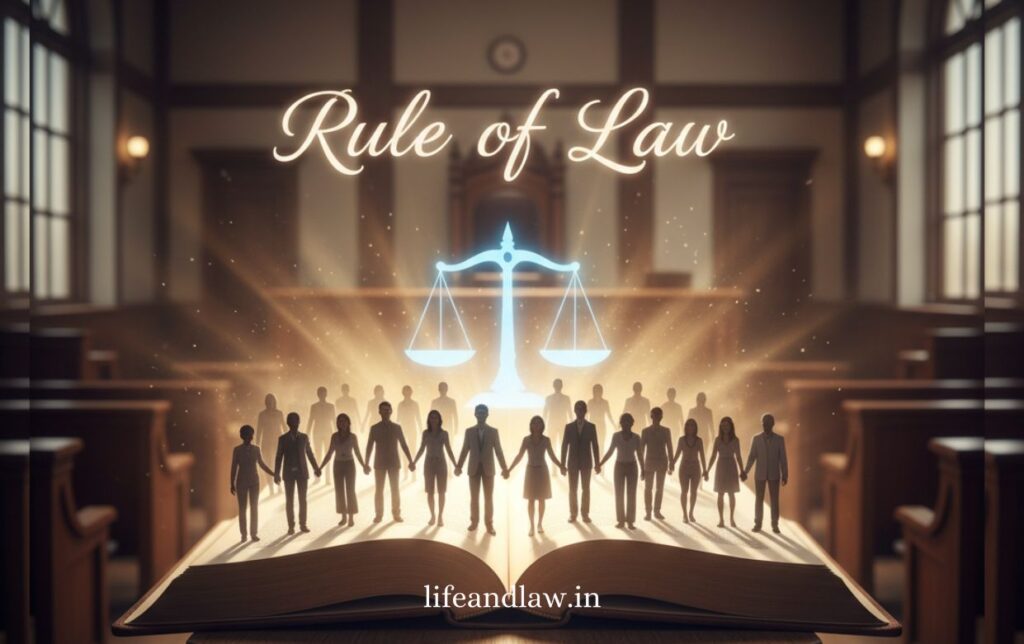Trending

Every year on September 21st, the globe celebrates International Day of Peace, a reminder that peace is more than just the absence of violence; it is also the presence of justice, equity, and harmony. In the twenty-first century, particularly in a complex and varied democracy like India, peace cannot be preserved by slogans or quiet; it must be built on a strong, impartial legal foundation.
The aim of this article is to investigate the critical link between peace and the rule of law, as well as why law enforcement and a trustworthy judiciary are necessary cornerstones for keeping peace in every community. Examining India’s unique difficulties and potential allows us to appreciate why the rule of law is more important than ever.
The rule of law is a fundamental element of democracy. At its essence, it means that no one is above the law, and that everyone—citizens, corporations, and even government officials—is equally accountable to it. It ensures that laws are applied in a fair, transparent, and independent manner.
We must make a distinction between the “rule of law” and the “rule by law.” The former defends individual rights and freedoms through justice, whilst the latter can be used to control others through legal means. In a healthy democracy, the rule of law promotes accountability and serves as a shield for the weak rather than a weapon for the powerful.
Peace does not merely mean the absence of visible conflict. Justice, equality, and mutual respect are some of the conditions that prevent conflict from erupting. These conditions are produced and preserved by legal systems such as: Impartiality, Accessibility and Predictable.
In India, where residents speak different languages, practice different religions, and come from various social backgrounds, the law is the sole common thread that binds us together. The legal system is how we resolve conflicts, preserve minority rights, and ensure that no group falls behind.
Consider property or land disputes, which are among the most common sources of social upheaval in rural India. When the judiciary intervenes to give a fair ruling based on facts and fairness, it not only fixes the immediate issue but also restores trust in institutions. This process of peaceful resolution is only feasible when the rule of law is upheld and implemented.
India has a great legal tradition, but it also faces significant challenges. The judicial system is frequently overburdened, and justice delayed is justice denied. Similarly, cases of biased law enforcement, politically influenced arrests, or unequal protection of rights can erode public trust in the legal system.
Peace in any community is dependent on two key institutions:
We have seen both sides in India. In important decisions such as Navtej Singh Johar v. Union of India (decriminalising homosexuality) and the Right to Privacy verdict, the Supreme Court affirmed dignity, equality, and freedom, advancing the cause of peace and progress. However, we have witnessed instances where delays, inconsistency, or inaction have resulted in public anger.
A peaceful society is one in which problems are addressed by fair legal procedures rather than street violence.
While courts and police are important in maintaining the rule of law, so are we—the citizens. A democracy works best when its citizens:
Know their rights and responsibilities.
Apply legal remedies instead of mob justice.
Support judicial independence.
Speak against misuse of power.
Encourage legal literacy within their communities.
Citizens must resist the urge to take the law into their own hands.Whether it’s a protest, a neighbourhood conflict, or an internet argument, peaceful legal action should always be the first option.
Remember that without justice, peace is unstable. Without citizens protecting the rule of law, justice cannot flourish.
In today’s environment of heightened emotions and pervasive misinformation, the rule of law acts as a stabilising force, protecting the vulnerable while holding the powerful accountable. It establishes the foundation for long-term peace and harmony in a varied country like India.
The article by Adv. Abdul Mulla, creator of www.asmlegalservices and www.lifeandlaw.in, emphasises the role of legal literacy in establishing a just and peaceful society via awareness, access, and empowerment.
Adv. Abdul Mulla (Mob. No. 937 007 2022) is a seasoned legal professional with over 18 years of experience in advocacy, specializing in diverse areas of law, including Real Estate and Property Law, Matrimonial and Divorce Matters, Litigation and Dispute Resolution, and Will and Succession Planning. read more….
Copyright BlazeThemes. 2025